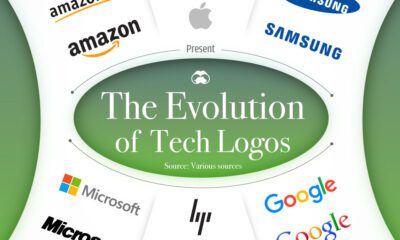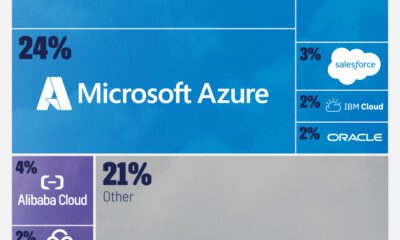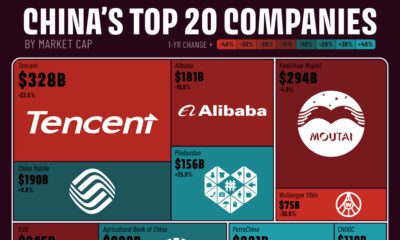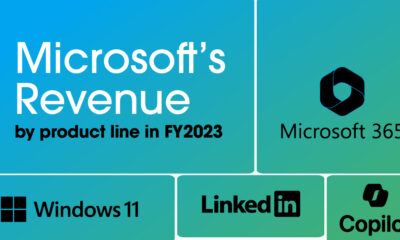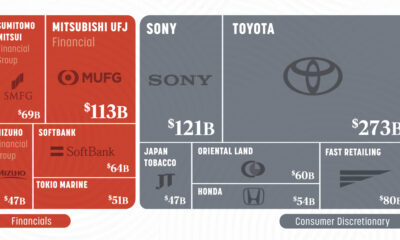Datastream
Visualizing the Biggest Gaming Company Acquisitions of All-Time
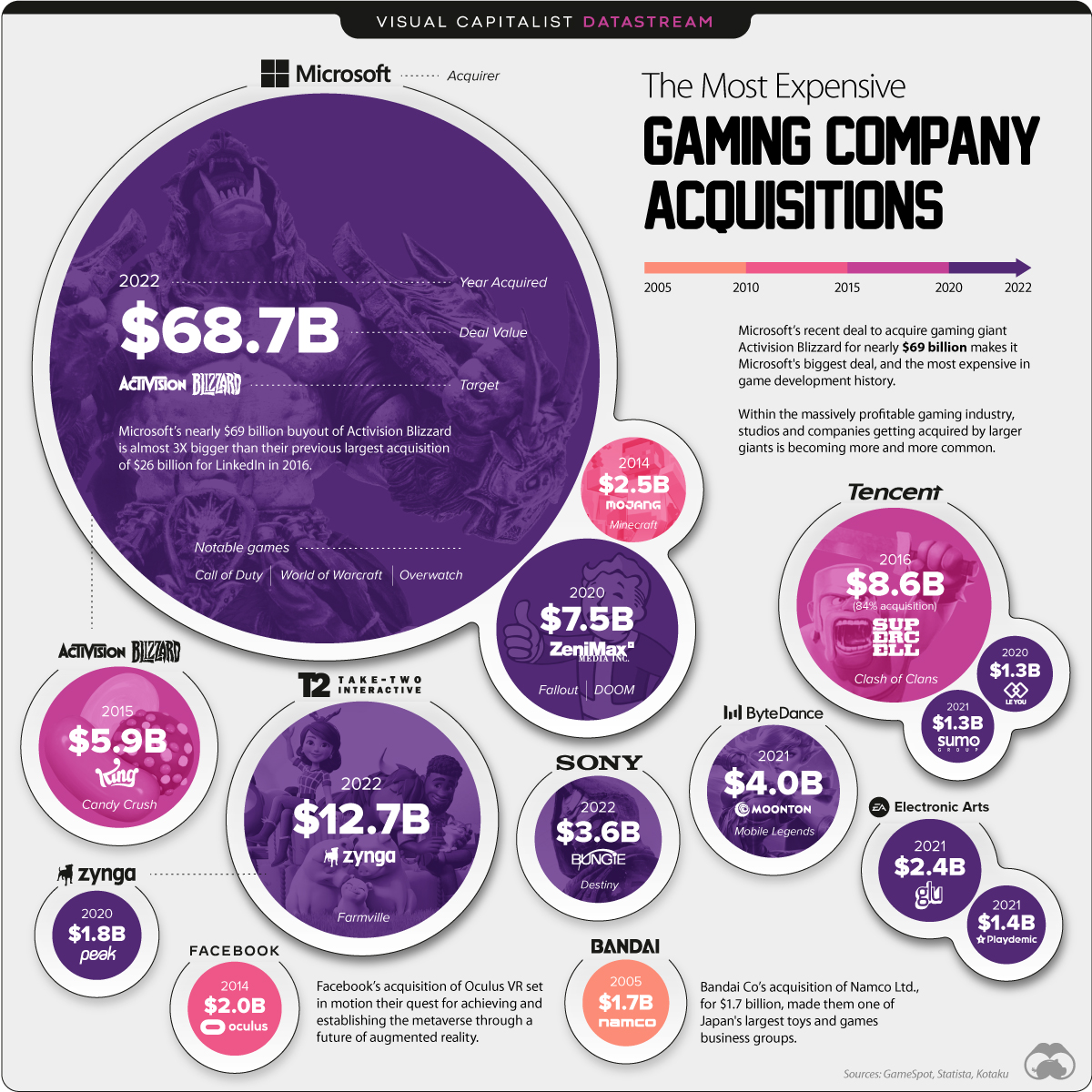
The Briefing
- Microsoft will acquire gaming giant Activision Blizzard for nearly $69 billion.
- 10 of the 15 biggest gaming company acquisitions have happened in the last three years.
The Most Expensive Gaming Company Acquisitions
Not even a week after Take-Two Interactive acquired mobile game developer Zynga for $12.7 billion, Microsoft claimed the title for the most expensive gaming acquisition in history.
The tech giant will acquire the famed gaming company Activision Blizzard, for $69 billion. This makes them one of the biggest video game development market players (a fact that has not escaped the notice of the FTC).
Such multi-billion gaming company acquisitions are quickly becoming a norm. Some of the largest takeovers have occurred in the past three to five years.
A Brief History of the Major Gaming Company Acquisitions
Until January 2022, Tencent’s $8.6 billion purchase of gaming publisher Supercell was the biggest video game industry acquisition.
2022 completely changed that with two of the biggest acquisitions happening within the first couple of weeks.
Here are the top 15 most expensive gaming company acquisitions in history:
| Rank | Acquirer | Target | Year of Acquisition | Deal size ($B) |
|---|---|---|---|---|
| #1 | Microsoft | Activision Blizzard | 2022 | 68.7 |
| #2 | Take-Two Interactive | Zynga | 2022 | 12.7 |
| #3 | Tencent | Supercell (84% Acquisition) | 2016 | 8.6 |
| #4 | Microsoft | ZeniMax Media | 2020 | 7.5 |
| #5 | Activision Blizzard | King | 2015 | 5.9 |
| #6 | ByteDance | Moonton | 2021 | 4.0 |
| #7 | Sony | Bungie | 2022 | 3.6 |
| #8 | Microsoft | Mojang | 2014 | 2.5 |
| #9 | Electronic Arts | Glu Mobile | 2021 | 2.4 |
| #10 | Oculus VR | 2014 | 2.0 | |
| #11 | Zynga | Peak | 2020 | 1.8 |
| #12 | Bandai | Namco | 2005 | 1.7 |
| #13 | Electronic Arts | Playdemic | 2021 | 1.4 |
| #14 | Tencent | Leyou | 2020 | 1.3 |
| #15 | Tencent | Sumo Group | 2021 | 1.3 |
10 of the 15 biggest gaming company acquisitions have happened in the last three years.
Microsoft’s Billion Dollar Bets on Video Games
Microsoft’s announcement to acquire Activision Blizzard is the clearest sign yet of the company’s ambitions to become a giant in the world of gaming.
This merger would make Microsoft the third-largest video game company globally in terms of revenue and the publisher behind games like Call of Duty and World of Warcraft.
The acquisition of Activision Blizzard wasn’t the only major takeover that Microsoft has ever made. Microsoft acquired ZeniMax Media in 2020 for $7.5 billion, and Minecraft creator Mojang Studios for $2.5 billion in 2014.
Here are all the gaming companies and studios that Microsoft currently owns:
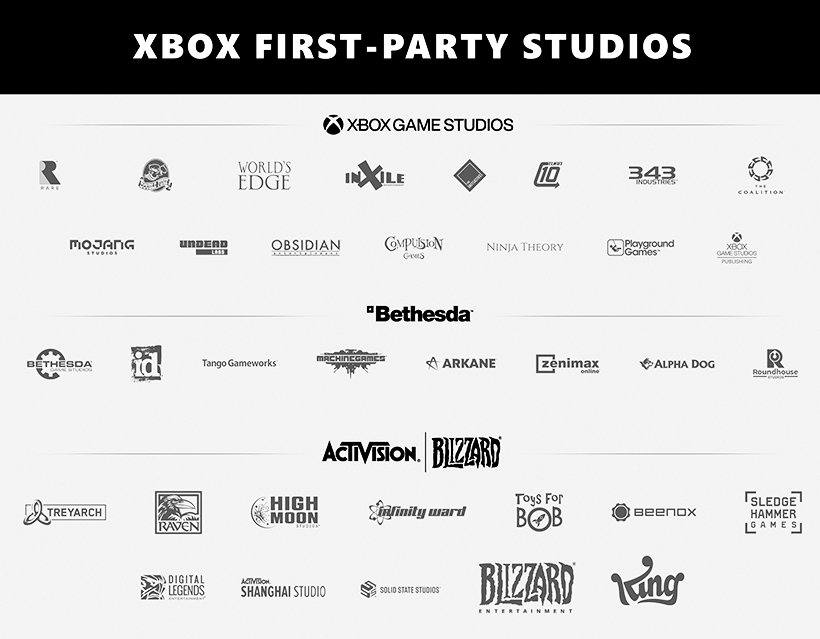
Part of the reason Microsoft has made such massive acquisitions is to play catch up and better compete in the gaming market. The sales of their Xbox console have also fared relatively poorly compared to PlayStation devices.
Sony’s announcement to buy Destiny creator Bungie might be their attempt to neutralize Microsoft’s recent acquisitions, and it remains to be seen how that will play out.
The Future of Gaming and Further Acquisitions
As mobile gaming revenues explode, companies are trying to cash in their relevance in the online social space. Even in the middle of a pandemic, around 1,500 mergers and acquisitions worth $43 billion took place in 2020.
With newer changes in the user experience domain cropping up, gaming is now inextricably linked to the current metaverse trend. As online games and streaming become mainstream, we might experience gaming in a completely new and immersive way.
As big tech companies continue to move into gaming to diversify their revenue streams, we may see more acquisitions and consolidations on the horizon.
Datastream
Can You Calculate Your Daily Carbon Footprint?
Discover how the average person’s carbon footprint impacts the environment and learn how carbon credits can offset your carbon footprint.

The Briefing
- A person’s carbon footprint is substantial, with activities such as food consumption creating as much as 4,500 g of CO₂ emissions daily.
- By purchasing carbon credits from Carbon Streaming Corporation, you can offset your own emissions and fund positive climate action.
Your Everyday Carbon Footprint
While many large businesses and countries have committed to net-zero goals, it is essential to acknowledge that your everyday activities also contribute to global emissions.
In this graphic, sponsored by Carbon Streaming Corporation, we will explore how the choices we make and the products we use have a profound impact on our carbon footprint.
Carbon Emissions by Activity
Here are some of the daily activities and products of the average person and their carbon footprint, according to Clever Carbon.
| Household Activities & Products | CO2 Emissions (g) |
|---|---|
| 💡 Standard Light Bulb (100 watts, four hours) | 172 g |
| 📱 Mobile Phone Use (195 minutes per day)* | 189 g |
| 👕 Washing Machine (0.63 kWh) | 275 g |
| 🔥 Electric Oven (1.56 kWh) | 675 g |
| ♨️ Tumble Dryer (2.5 kWh) | 1,000 g |
| 🧻 Toilet Roll (2 ply) | 1,300 g |
| 🚿 Hot Shower (10 mins) | 2,000 g |
| 🚙 Daily Commute (one hour, by car) | 3,360 g |
| 🍽️ Average Daily Food Consumption (three meals of 600 calories) | 4,500 g |
| *Phone use based on yearly use of 69kg per the source, Reboxed | |
Your choice of transportation plays a crucial role in determining your carbon footprint. For instance, a 15 km daily commute to work on public transport generates an average of 1,464 g of CO₂ emissions. Compared to 3,360 g—twice the volume for a journey the same length by car.
By opting for more sustainable modes of transport, such as cycling, walking, or public transportation, you can significantly reduce your carbon footprint.
Addressing Your Carbon Footprint
One way to compensate for your emissions is by purchasing high-quality carbon credits.
Carbon credits are used to help fund projects that avoid, reduce or remove CO₂ emissions. This includes nature-based solutions such as reforestation and improved forest management, or technology-based solutions such as the production of biochar and carbon capture and storage (CCS).
While carbon credits offer a potential solution for individuals to help reduce global emissions, public awareness remains a significant challenge. A BCG-Patch survey revealed that only 34% of U.S. consumers are familiar with carbon credits, and only 3% have purchased them in the past.
About Carbon Streaming
By financing the creation or expansion of carbon projects, Carbon Streaming Corporation secures the rights to future carbon credits generated by these sustainable projects. You can then purchase these carbon credits to help fund climate solutions around the world and compensate for your own emissions.
Ready to get involved?
>> Learn more about purchasing carbon credits at Carbon Streaming
-

 Markets1 week ago
Markets1 week agoU.S. Debt Interest Payments Reach $1 Trillion
-

 Business2 weeks ago
Business2 weeks agoCharted: Big Four Market Share by S&P 500 Audits
-

 Real Estate2 weeks ago
Real Estate2 weeks agoRanked: The Most Valuable Housing Markets in America
-

 Money2 weeks ago
Money2 weeks agoWhich States Have the Highest Minimum Wage in America?
-

 AI2 weeks ago
AI2 weeks agoRanked: Semiconductor Companies by Industry Revenue Share
-

 Markets2 weeks ago
Markets2 weeks agoRanked: The World’s Top Flight Routes, by Revenue
-

 Demographics2 weeks ago
Demographics2 weeks agoPopulation Projections: The World’s 6 Largest Countries in 2075
-

 Markets2 weeks ago
Markets2 weeks agoThe Top 10 States by Real GDP Growth in 2023




